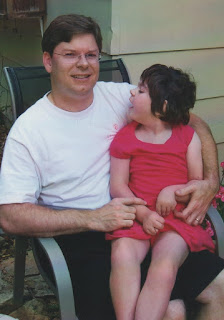Dare to See Your Probable Future: Unpaid Caregiving
The emotional, physical, and financial costs are too high to be unprepared
If you live long enough, you or someone you care about will become disabled. Disability is the largest minority group in America and growing rapidly. If it hasn't already, it will eventually touch you, so you should be prepared.
If you are not currently impacted by caregiving, go out on your street. Count the houses or apartments. When you get to five, instead of saying "five," say "caregiver." 1-2-3-4-caregiver. How many times did you say that? In the U. S., one in five houses is impacted by long-term caregiving.
Now, walk down the street and keep counting. If you walked across the country, you'd say "caregiver" how many times? 34 Million. That's right, there are an estimated 34 million unpaid caregivers (of a ill or disabled adults) in America right now.
 |
| One in Five Houses impacted by unpaid caregivers |
What's the financial cost?
You think you will have the money to care for your ailing parents: Not likely. An estimated 90% of long-term care is provided by unpaid caregivers. That means you. You will be caring for your spouse or parent or child all by yourself. Unless you are independently wealthy, you can't afford to pay someone to do all of the care.
 |
| 90% of caregivers are unpaid |
More than a third of caregivers reduced their hours at work or quit their jobs. For those caring for an elderly family member, these caregivers paid, out of their own pockets, an average of $5,531 in 2007. So, not only were they supplying free in-home care (the equivalent of tens of thousands of dollars), they were paying extra.
Two thirds, or more than 6 in 10, caregivers forwent their own medical needs, such as visiting a doctor, in order to put their family's needs first. More than half said they didn't have time to care for themselves because they were too tired.
How will you cope?
A little more than half of those caregivers report that their own health has declined as a result of this added work. And what's worse, they report that their own declining health is affecting their ability to provide the level of care they wish to give.
About one third of caregivers say they struggle to find time for themselves. About 3 in 10 report that they are struggling with the high level of stress, balancing work and family.
So how are these caregivers dealing with this stress? About 7 in 10 say that prayer helps with the stress. About 6 in 10 talk with family or friends about their struggles, and 4 in 10 read books and other materials to help.
Why do I Care about Caregivers?
 |
| Savannah and her Daddy |
I've been there. I've been that person who lived as a virtual shut-in for years. I didn't work. I cared for my significantly disabled daughter 24/7/365 for several years before I finally got some help. Slowly, I learned to organize my life in a way that I could take care of myself and her. It was a long, difficult road. Since then, I've written the book I wished I'd had 15 years ago.
If you're struggling with stress, feelings of isolation, or that you just can't do this, please take a look at my story. Remember, 4 in 10 caregivers have found help in reading about it. You are not alone. The book is titled, And Yet We Rise: A Tale of Coping, Overcoming, and Transcending. It's raw, unfiltered, and strikingly honest. However, it is balanced with humor, tenderness, and hopefulness.
Praise from Readers:
"If I had one word to describe this book, it would be HOPE." --Janelle Blank
You can also find me on:
Twitter @dsborden
Instagram: https://www.instagram.com/davidborden5912/
Website: www.ScribbleFire.com
I'd like to gratefully acknowledge https://www.disabled-world.com/disability/caregivers/ for statistical citations. Visit them for more information.
#caregiving #traumaticbirth #braininjury #care #selfcare #elderly #eldercare #aging #chronicillness #disability #specialneeds



Comments
Post a Comment